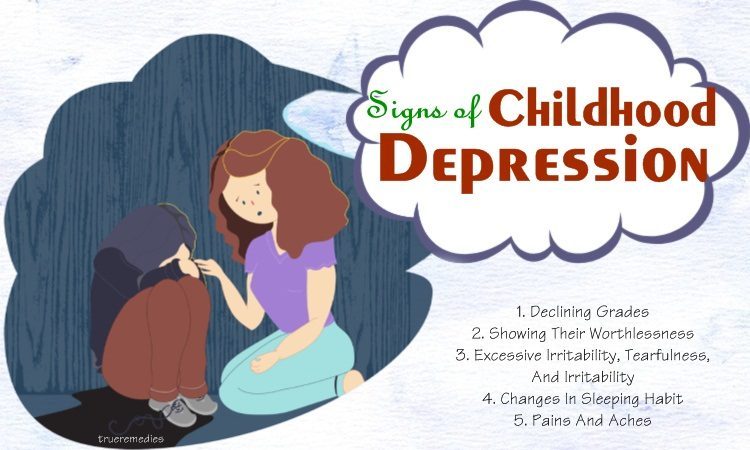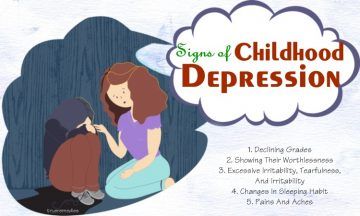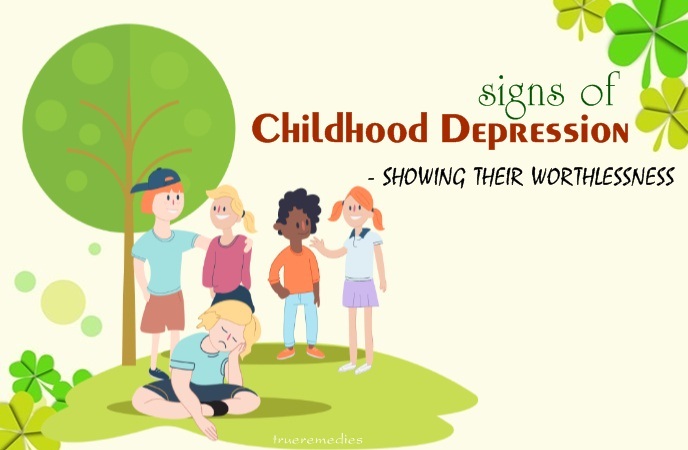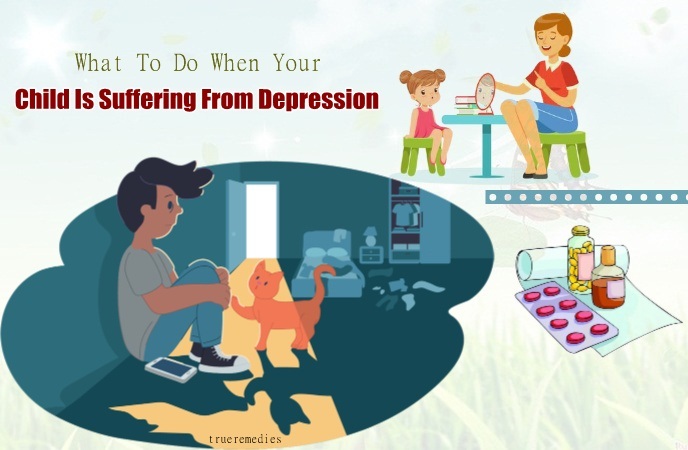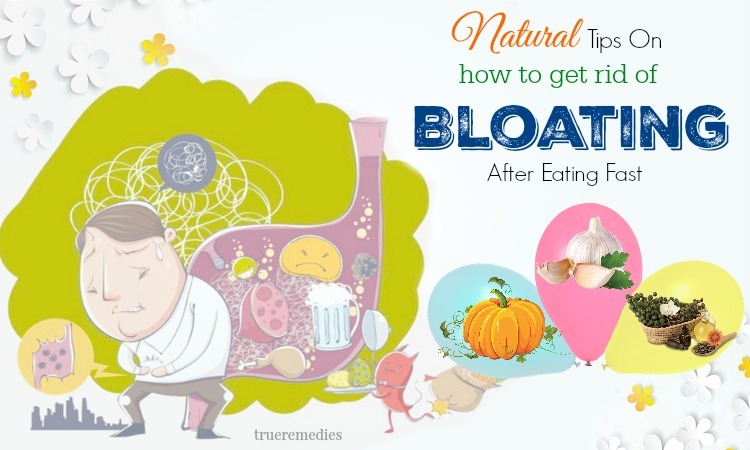Contents
Depression is a serious emotional condition that affects not only adults but also children. According to the National Institute of Mental Health 2007; U.S. Public Health Service 1999, one out of ten children is experiencing a serious emotional condition. Depression influenced 2% of elementary school-age children, 0.3% of preschoolers and 5-10% of adolescents[1]. This condition is more serious and severe than normal anxiety and sadness, causing negative effect on a child’s ability to connect with his family and friends, attend school, focus, enjoy daily activities, etc. For a child who has to struggle with depression, childhood is a nightmare that he is afraid and does not want to face. Taking care of our children, we should pay attention to their emotions and thoughts. Knowing the warning signs of childhood depression is the first step to help them get out of their nightmare, start a new life, and enjoy their exciting childhood.
- 29 Good Social Manners For Parents To Teach Their Kids
- 5 Best Questions To Ask Your Child Today & Every Day
- 12 Warning Signs Your Child Is Being Bullied At School
Causes Of Childhood Depression And Anxiety
There is no obvious single cause of depression. It can be caused by environmental factors, genetics, a stressful situation, a medical illness, etc.[2] [3]. Some children are more susceptible to depression. For example, ones with anxiety or behavior problems are more likely to become depressed[4]. Sometimes, it is difficult for you to identify the hidden causes of this medical condition, but here are the common triggers:
- Family History Of Depression: Children coming from a family that has a history of depression are more likely to get depressed, compared with ones of the family without depression history[5] [6]. It does not mean all children having a family history of the condition will suffer from depression or children not having a family history of depression can not become depressed over time. But knowing this risk, we can keep closer eyes on our child’s emotions, actions, and behaviors to diagnose the depression if it occurs.
- Bullying And Pressure From Peer: According to the National Bullying Prevention Center, there are about 19.6% high school students who report getting bullied at school. In fact, the number of children impacted by bullying from academic years is more than that as there are many cases the victims of bullying are afraid or reluctant to speak out their mind. Being bullied can lower a child’s self-esteem and lead to constant stress, sending him or her into a depressive state. So, it is a reason why children with persistent bullying and peer pressure have more risk of this condition[7] [8].
- Chemical Imbalances: For some children, a chemical imbalance in their system causes depression. Growth spurts and hormonal changes could result in these imbalances and its triggers could be a lack of physical activity and improper nutrition.
- Lifestyle changes: Children can not adapt well to changes. All big events or changes including moving to a new house, the divorce of their parents, changing school, or having a new sister or brother will impact on children’s lives. So the tip to prevent the depression is to ease this transition and make the experience enjoyable for everyone.
13 Warning Signs Of Childhood Depression And Anxiety
1. Declining Grades
When a child is suffering from depression, his academic grades will drop because of the poor attention and lack of focus. Your child could not listen to the tutor and lessons from a teacher or do his homework.
Therefore, if your child’s grades are lower than usual, it would be one of the signs of childhood depression you can notice. It is important for you to build a good relationship with your child’s teachers and tell them you want to know about your child’s study and performance in class.
You may receive a lot complain about the loss of concentration and attention. It is understandable that we all want our children to perform better at school. But getting angry or showing your disappointment when your child is getting depressed only makes the situation worse.
The thing you need to do when seeing your child’s grades are dropping is to find the root causes by asking them open questions. Most children with depression report that they get confused and feel like their mind is not working well, as they often have to do tasks against and against. To make your child overcome depression, you need to understand that feeling.
TrueRemedies Partner Solutions

Need a Help from the Leading Expert Online, Available 24/7?
They’re all here and ready to answer your questions online or by phone. Keep asking questions until you get the answer you need.
2. Showing Their Worthlessness
You should take it seriously when your child often says things like “I am worthless” or “No one likes me.” If not addressed and solved, these negative thoughts will become awful consequences, leading to self-harm action and even suicide death.
If your child is showing his worthlessness, you should make a friendly conversation with them to find the cause and positive future. Always encourage your child to think everything in a positive way, and you should compliment their efforts for trying to do something, not focusing only on the result.
In serious cases, it is recommended taking a child suffering from childhood depression to a therapist who can identify those depression-oriented thoughts and help him or her to find another way to look at.
3. Excessive Irritability, Tearfulness, And Irritability
These excessive emotions and behaviors are one of the signs of childhood depression and anxiety. They cry a lot, express the increase of irritability and anger. How many parents see those signs without notice?
The extreme behaviors indicate that your child is unable to control their overwhelming emotion and really needs your help.
Therefore, when you see children showing their uncontrollable emotions and behaviors, whether it is explosive behavior or just quiet tears, you should pay attention to the signs.
4. Changes In Sleeping Habit
Teens and children are known for sleeping a lot, and they often wake up late the next morning. Any uncharacteristic or abnormal changes in sleeping habits of children could be one of the common warning signs of childhood depression[9]. Children love sleeping, but a child with depression will wake up early and can not go back to sleep again while some want to spend the entire afternoon on snapping.
Because sleep can not help them restore their energy, they will always feel tired and exhausted the next day. That fatigue will affect children’s social and academic lives, and the impacts are apparent. They will often be late to miss things. They won’t do homework because they can not sleep at night but may often sleep in the afternoon.
5. Pains And Aches
Stomach pain and headaches are not just about the physical problem. Suffering from depression also result in pains and aches without obvious reasons. It also could be due to not working depression medication and strategies. Only when the depression is solved completely, those stomachaches and headaches will go away.
6. Withdrawal From Friends, Family, and Favorite Activities
Not only adults but also children with depression tend to withdraw themselves from social activities. For instance, they won’t play or talk to friends and family, or they lose interest in their favorite activities. This sign will be difficult for us to identify because teens and children tend to play with some friends while avoiding others. But it is important for you to be aware of the disengagement.
Ask ourselves questions like “Are they isolating themselves from social activities and spending the entire days and weeks alone? Do they feel tired a lot? Are they sleeping all day without interest in any activities?” These questions can help us identify the difference between our children and know whether they are suffering from depression or not.
7. Reject Fun Plan
The stress of homework, school study, sports performance, friendship drama, and music auditions will make your child feel down. One of the signs of childhood depression is to reject any fun plan or vacation you want to give them to make them happy.
To check whether your child is suffering from depression, you can ask him questions like “Do you want to join in a vacation with our family to lift our spirits?”. If they don’t respond, it may be one of the warning signs of childhood depression. Depressed children don’t want to respond or may feel uncomfortable when someone asks questions like this.
8. The Feeling Of Guilt, Regret, And Shame
Depression is a constant battle for a child. They may think that their little mistakes are the worst and experience embarrassment and shame. It does not mean a child saying sorry sincerely when doing something wrong is being depressed. But it is not normal for a 7-year-old child to punish himself physically over the little mistake like a forgotten assignment. The depression and anxiety will make the child think everything on the dark side. It is important for parents to stand side by side with their children to fight the inner voices that can destroy them.
9. Always Have Tense Conversation
Although the blues are one of the warning signs of childhood depression and anxiety, it is still difficult for you to recognize. This is because many teens and children may not look sad even when they are suffering from depression.
But you can look for the irritability to figure out whether your child is getting depressed. Children and teens tend to have mood swings. They can be sad after school but will feel better by dinner. However, if your child gets angry and snaps at you or someone else without any reasons, you should pay attention to other depression symptoms.
10. Cry More Than Usual
Crying is a way people show their emotion. Children often cry in certain situations, but if your child sobs regularly, it is necessary for you to check the triggers and look for other signs of depression for sure. What other behavior is associated with depression, or does your child shut down and not feel interested in the activities they used to do? If you find something is not right, you should make an appointment with the pediatrician.
11. Happy Memories Don’t Lift Your Kid’s Emotion
Some children look unhappy and sad, but it does not mean they are depressed. To know if your child is experiencing depression or just feels sad, you can observe how your child responds when you talk about the happy memories.
Someone who just feels unhappy will lift up when listening to some of their good times, but it can not light up a depressed child.
12. Reject To Be Comforted
Feeling blue or sad is normal when you have to face some upsetting life events, but people always appreciate the emotional support during hard times, especially from their family or friends. Unfortunately, a depressed child always rejects the hands your give and the shoulder you extend, as he knows the sadness won’t go away.
13. Changes In Eating Habits
Changes in eating habits could be one of the warning signs of childhood depression and anxiety. A depressed child can hunger for sugar even though he was a picky eater, or your child shows no interest in eating anymore.
Normal kids will change their relationships with food naturally and gradually during their growing up; however, a sudden major shift will indicate that you may get depressed.
What To Do When Your Child Is Suffering From Depression
1. Depression Treatment
Taking a depression treatment will take time, involving some trial and failure. There is no the same treatment for two kids, but it is important for you and your child to keep patient with the process to make the symptoms of depression in children go away.
- Education: You should educate your child about the facts, symptoms, prevention, and treatments for depression. That will help your child understand the basic and useful information about this condition, and when your child has to face this emotional problem, he won’t feel confused or get lost. Furthermore, it also normalizes the things your child is suffering.
- Psychotherapy: Counselling is an effective solution for kids with depression and anxiety. The counseling has several different kinds, and there is no rule is that what works for one can work for another. For example, very young children should join in play therapy, while cognitive-behavioral therapy (CBT) is suitable for teens and kids. It is worth for you to take time to find the right therapist/patient match.
- Medication: For moderate to severe cases of depression, taking medication might be an important step for a child to overcome his emotional problems. However, it is recommended that combining medication with counseling. Furthermore, medication needs to be taken with the close supervision of a physician.
- Hospitalization: In serious cases such as suicidal ideation, hospitalization is a needed solution for your child.
2. Solutions At Home
The medication or hospitalization, as well as other treatments of depression, is not a quick fix. Treatment for depression can be arduous and long. Parents can give their child the great support and encouragement by doing the following things:
- Encourage your child to take part in daily exercises. This does not need to include an organized sport. Family walks are good.
- Spend time talking. Counseling will make your child willing to open up and speak out their feelings. So, your necessary task is to listen and provide your child the useful support when they are ready to talk about their problems at home.
- Consult your physician before taking any medication. It is important for medication management.
- Cook healthy and balanced diet. Provide your child the healthy lifestyle to improve the treatment process.
- Encourage your child to sleep enough and properly. Sleeping is an important time for your body and mind to restore. For a depressed sleeping, it also boosts the improvement and makes them feel better.
3. Solutions At School
When a child is getting depressed, his academic performance is affected due to the poor concentration and thinking. A depressed child does not need to quit school. He just needs support from the classroom teacher, a school counselor, and a psychologist to help his work during this difficult time.
There are significant classroom suggestions that can support your child during this time, including:
- Extend time for the long tests and assignments
- Help the child create a suitable and logical homework and study schedules
- Make the big assignments divided into manageable pieces
- Provide the child the copy of class notes ( benefit someone with poor concentration)
- Provide the depressed child a quiet environment, free from distractions to do tests
It is useful for you to check whether your child needs a break for school. You should have a daily check in with a psychologist or a school counselor in the early stage of depression treatment. A weekly appointment is also recommended to check your child stability.
As you can see, irritability, sadness, outbursts, and feeling overwhelmed are common signs of childhood depression and anxiety. This time for a child is difficult and challenging; therefore, parents should keep calm and provide active listening. It is understandable when parents want to fix and put a stop to the problem quickly ; however, this mental condition is more complicated than we thought. There is no quick fix or stop for this. But it can improve over time. With the right treatment of depression and great support, your child will start to feel better and enjoy the childhood experiences again. Any questions can be left in the comment section of Trueremedies.com, and we will answer them as soon as we can.

